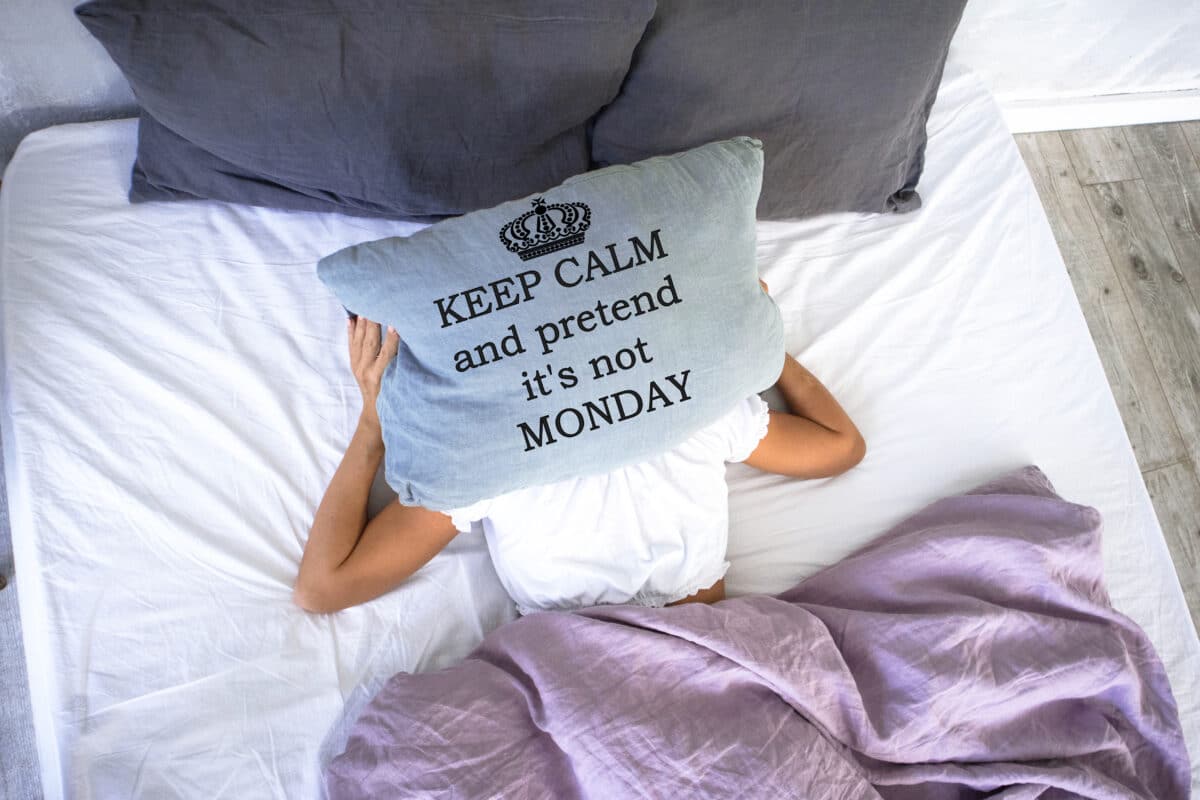
(© milanmarkovic78 – stock.adobe.com)
In A Nutshell
Older adults who reported feeling anxious on Mondays had, on average, about 23% higher long-term levels of cortisol than those who felt anxious on other days.
Chronic elevations in cortisol are linked to health risks like high blood pressure, heart disease, and weakened immunity.
Researchers analyzed hair samples to assess stress hormone levels over two to three months, providing a longer-term picture than traditional blood or saliva tests.
While the study shows an association, not causation, it suggests that Monday anxiety may have a unique and lasting impact on the body’s stress system.
HONG KONG — Ever feel a sense of dread as Sunday turns into Monday? New research suggests that anxiety felt at the start of the workweek may not simply fade with the passing of the day — it could be linked to stress hormone patterns that persist in the body for up to three months.
A study involving more than 3,500 older adults in England found that people who reported feeling anxious specifically on Mondays had significantly higher levels of cortisol (the body’s primary stress hormone) in hair samples collected one to two months later. At the highest levels of the stress hormone distribution, individuals who felt anxious on Mondays showed approximately 23 percent higher cortisol than those who felt anxious on other days.
While it has long been known that stress can affect physical health, these findings suggest that Monday anxiety may have a unique association with the body’s stress response. The researchers found that this pattern did not appear for anxiety reported on other days of the week.
Why Monday Stress May Matter More
Elevated cortisol levels over time are linked to increased risk for cardiovascular disease, high blood pressure, diabetes, and weakened immune function. The study references prior research showing that heart attacks and sudden cardiac deaths occur about 19 percent more often on Mondays than on other days, a phenomenon commonly known as the “Monday effect.”
Importantly, the study observed that this effect appeared both in people who were still working and those who had retired. The researchers found no evidence that the pattern weakened among those no longer in the workforce, suggesting that the biological impact of Monday anxiety may persist even when the immediate source of work-related stress is removed.
Previous studies have demonstrated that people tend to report higher stress and anxiety on Mondays and that cardiovascular events often increase at the beginning of the week. However, this research, published in the Journal of Affective Disorders, is among the first to show a clear link between Monday anxiety and a measurable biological stress marker that can be traced for months.

It turns out that Monday anxiety can do more than just ruin the start of the work week. (Photo by Denys Bohdanov on Shutterstock)
How the Study Linked Monday Anxiety to Higher Cortisol
The research team, led by Dr. Tarani Chandola of the University of Hong Kong, analyzed data from the English Longitudinal Study of Ageing, which includes adults aged 50 and older. Participants were asked, “Overall, how anxious did you feel yesterday?” on a scale from 0 to 10, and recorded what day of the week “yesterday” referred to.
Hair samples were then collected one to two months later from the back of each participant’s head. Because human hair grows at an average rate of about one centimeter per month, the 2–3 centimeter samples provided a retrospective record of stress hormone production over the previous two to three months. The hair was analyzed for both cortisol and cortisone using high-performance laboratory methods that allow researchers to assess long-term patterns, rather than just momentary spikes.
When the results were examined, the researchers found that Monday anxiety was strongly linked to higher long-term cortisol levels. No similar association was found for anxiety reported on other days.
Why Stress Effects May Linger Beyond the Workweek
To understand why Monday anxiety may have this unique link, the researchers used advanced statistical methods to break down the data. They found that while a portion of the effect was explained by the fact that more people tend to feel anxious on Mondays, about three-quarters of the difference remained unexplained by typical factors such as age, sex, or general anxiety. This suggests that for some people, the stress linked with Monday anxiety may reflect a deeper pattern that the body does not easily adapt to.
The study authors note that “the cumulative life course effects of feeling anxious on Monday, to which people do not adapt, suggests the need to identify why some people do not adapt to the Monday effect, while others are more resilient.”

High levels of cortisol are linked to (Photo by Jarun Ontakrai on Shutterstock)
What This Monday Anxiety Research Means for Your Health
The study cannot prove that Monday anxiety directly causes long-term biological damage. Its design shows only an association, and other unmeasured factors could play a role. Still, the findings highlight how the start-of-week stress that many people brush off as a passing inconvenience may be more significant than it seems.
Hospitals and clinics already prepare for an uptick in cardiovascular events on Mondays. This research provides further evidence that the dread associated with the first day of the workweek may echo in the body’s stress system well beyond the day itself.
Disclaimer: This article is for general information only and does not constitute medical advice. Always consult your doctor or a qualified healthcare professional if you have concerns about stress, anxiety, or any aspect of your health.
Paper Summary
Methodology
Researchers analyzed data from 3,511 adults aged 50 and older living in England, collected between 2012 and 2013 as part of the English Longitudinal Study of Ageing. Participants were interviewed about their anxiety levels from the previous day, rating their feelings on a scale from 0 to 10, and were asked to specify which day of the week they were referring to. Hair samples were then collected 1-2 months later during nurse visits. The hair samples, measuring 2-3 centimeters in length, were analyzed using advanced laboratory techniques to measure cortisol and cortisone levels, which reflect stress hormone production over the preceding 2-3 months. The researchers used quantile regression models to examine the relationship between day-of-week anxiety and stress hormone levels across different points in the cortisol distribution.
Results
The study found that older adults who reported feeling anxious on Mondays had 23% higher cortisol levels in hair samples collected up to two months later, compared to those who felt anxious on other days of the week. The effect was most pronounced at the 90th percentile of the cortisol distribution, representing the highest stress hormone levels. No significant differences in cortisol levels were found for anxiety reported on other days of the week. The Monday effect persisted regardless of employment status, appearing equally in both working and retired individuals. Statistical decomposition revealed that while higher rates of Monday anxiety explained 23% of the cortisol difference, 77% remained unexplained by observable factors, indicating a distinct biological response to Monday anxiety.
Limitations
The study’s observational design prevents definitive conclusions about causation, and the researchers note that unobserved confounding factors could influence the results. The hair samples varied in length between 2-3 centimeters, meaning the time period reflected in stress hormone measurements wasn’t identical for all participants. Additionally, the study only captured anxiety and stress hormone levels at single time points rather than tracking changes over time, and repeated measures of stress hormone activity were not available.
Funding and Disclosures
The authors declared no competing financial interests or personal relationships that could have influenced the research. No specific funding sources were mentioned for this study.
Publication Information
The research was published in the Journal of Affective Disorders, Volume 389, in 2025. The study was titled “Are anxious Mondays associated with HPA-axis dysregulation? A longitudinal study of older adults in England” and was authored by Tarani Chandola, Wanying Ling, and Patrick Rouxel from the University of Hong Kong.

